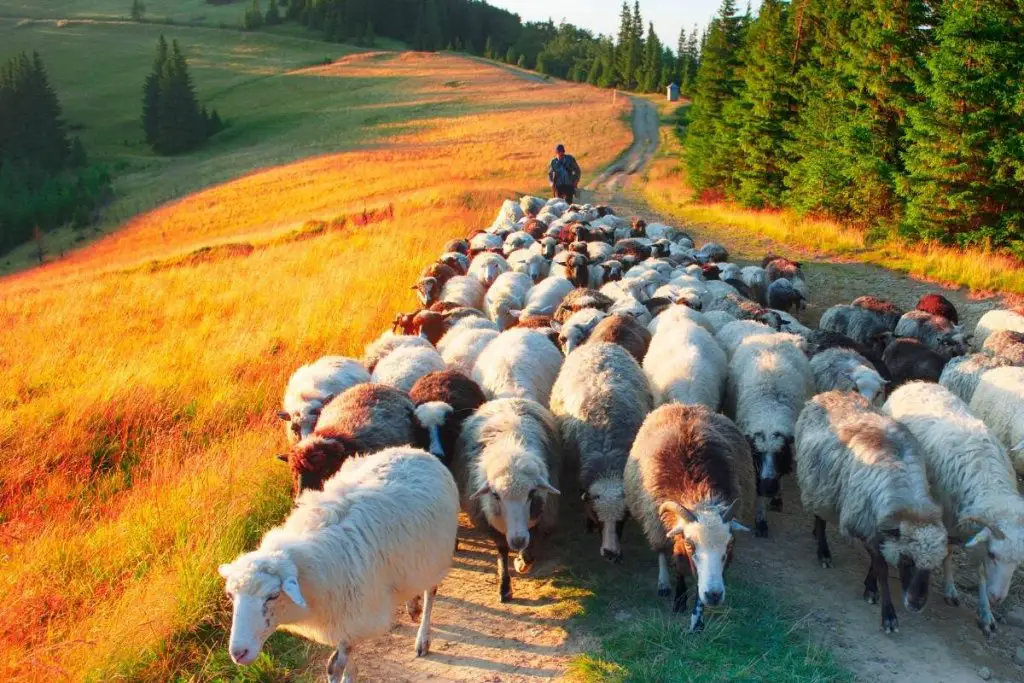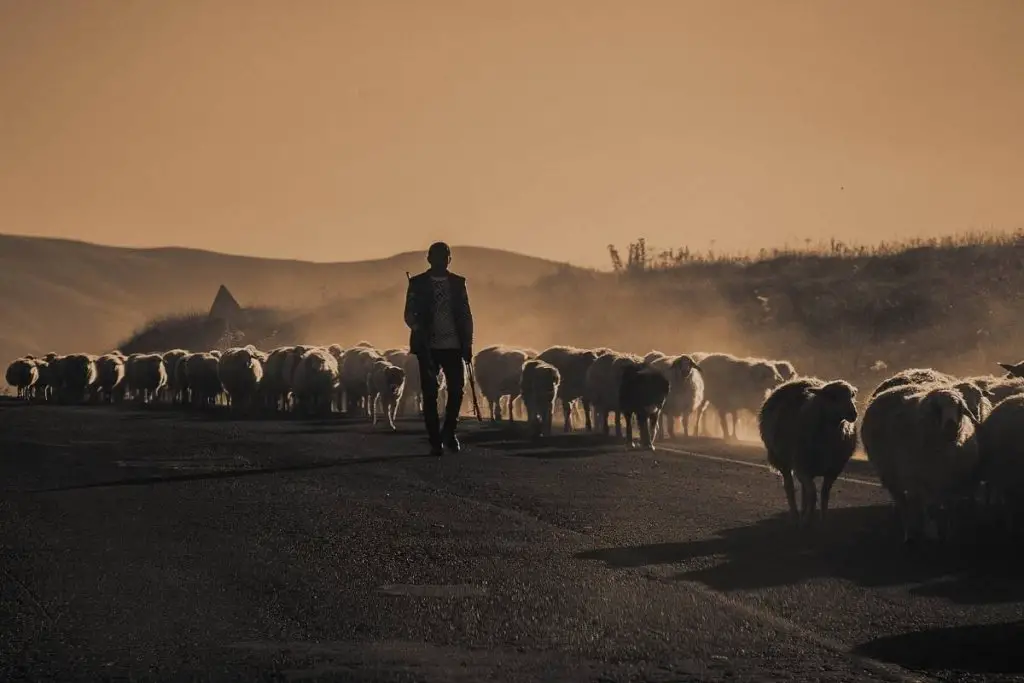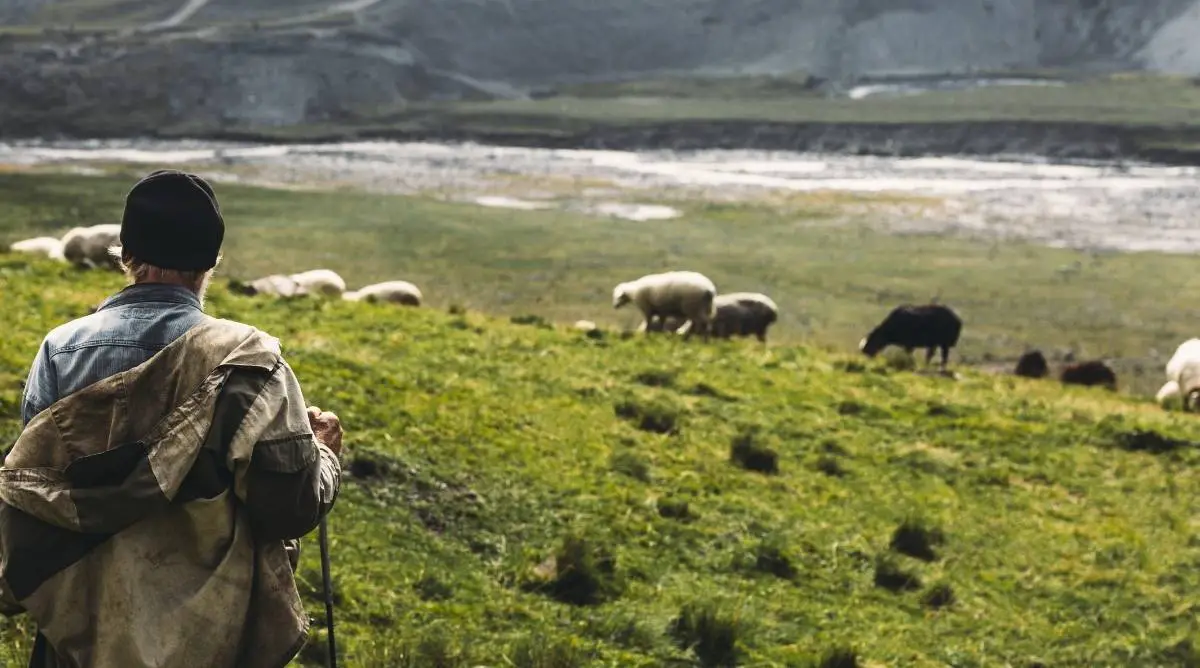Sheep need shepherds for protection, shearing, and general health. A shepherd guides sheep to better pastures and water, shears them, and guards the flock from predators. Shepherds also watch out for the health of their flock of sheep, helping prevent diseases and heal injuries.
Table of Contents
Why Do Sheep Benefit From Shepherds?
Although wild sheep can survive on their own, domesticated sheep require shepherds for protection, shearing, and safeguarding general sheep welfare. The shepherd-sheep relationship has existed for over five thousand years.
Shepherds may be responsible for hundreds of sheep, and often use dogs to keep the flock safe and moving in the right direction. In addition to protection and shearing, shepherds must also pay close attention to ewes giving birth and to newborn lambs.
What Does A Shepherd Do For The Flock?

A shepherd’s role is varied, but includes the following:
Protect Their Sheep
Sheep are prey animals and are vulnerable to many types of predators.
A shepherd guards the flock against attacks. Domestic sheep have limited abilities to protect themselves from attack when grazing in the open. Shepherds can ensure their flock stays in safe areas, and can ward off predators when they come close.
Move the Flock Away from Unsafe Areas
Sheep may follow each other blindly into dangerous areas, or even off cliffs or into dangerously strong currents.
A shepherd must watch the environment closely and keep his sheep from wandering into unsafe places. Shepherds must also know how to recognize poisonous plants and shrubs so they can redirect their flock away from them. Whether by using a border collie to manage the flock or by training the flock to follow their lead, shepherds can guide sheep toward safety and away from danger.
Feeding and Birthing Lambs
Ewes frequently need assistance when giving birth. Shepherds pay close attention to ewes giving birth to watch out for the life of the ewe and the lamb.
After delivery, newborn lambs may need special care to maximize their chances of survival. They may need bottle-feeding or supplements.
Grooming and Shearing
Shepherds clip hooves and check sheep and lambs for harmful parasites. They also shear sheep regularly.
Rounding Up Lost Sheep
Sheep naturally wander while grazing to find better food, and it’s possible for them to become separated from the flock. Shepherds keep an eye on sheep who have strayed, in order to bring them back.
Keeping Sheep Healthy
Shepherds ensure their sheep are vaccinated, de-wormed and given medical attention when necessary. They watch sheep for any limps, injuries, unusual behavior, and possible signs of illness.
Can Sheep Survive Without a Shepherd?

Domesticated sheep are unlikely to be able to survive entirely on their own.
Some breeds of sheep can be left to graze alone for long periods of time, especially if they are in an area without natural predators. Black Welsh Mountain sheep are an example of this. Shepherds leave them to graze alone for months at a time, gathering them every few months for lambing or shearing.
Most breeds need more attention. Shepherds are typically on hand to manage their day-to-day health, as well as to shear them and help avoid complications during pregnancy.
Without a shepherd, sheep may experience:
- Parasites
- Injuries
- Sickness
- Attacks from predators
- Dirty, heavy, and overgrown wool
- Difficulty walking due to overgrown hooves
What Skills Do Shepherds Need?
In addition to the day-to-day management of their flock, shepherds must pay close attention to the health and welfare of their animals.
- Juggling multiple tasks: From guiding sheep to greener pastures to warding off predators to managing pregnancies, shepherds have a varied job description. The job can be mentally and physically draining and requires juggling multiple tasks at once.
- Endurance: Shepherds endure extreme weather conditions along with their sheep.
- Alertness: When pasturing sheep, shepherds must keep a close eye on the flock to look for signs of danger. This means not only watching for predators but for any sheep who may stray from the flock. They must also ensure their sheep don’t go too close to dangerous areas, like a cliff’s edge.
- Managing pregnant ewes: Shepherds must pay close attention to pregnant ewes and newborn lambs and must be on hand during births to maximize the chances of survival for both. They may need to decide to save the life of the ewe or lamb during complicated pregnancies.
- Managing animal welfare: Shepherds must watch their animals closely, looking for abnormal behavior that may indicate sickness or parasites. Some life-threatening situations can be avoided if noticed in time.

